It is wonderful to live and sing. It is a great thing to feel that one is able to help other people with one’s voice. I want to play in a new opera where the heroine does not die in the last scene or go mad. That is why I love Charpentier’s Louise. The girl is alive when the curtain falls – and it is wonderful to be alive, isn’t it!
— Grace Moore – a few days before the plane crash that took her life
We Appalachians love our bright lights, our stars, our famous people. We feel a tremendous pride in each person who “made it big,” as he or she characterizes a more realistic us, or defends our culture in word, song, and deed. And the nation as a whole adores that person, too. In today’s society, Dolly Parton comes to mind. She is revered and adored by just about the whole country, from children to adults. Her rags-to-riches story has inspired (and continues to inspire) so many people. And her very real, folksy personality is so refreshing and honest.
What happens, however, to those revered persons who were once our bright lights, whose souls illuminated the mountains, the country, and the world, but have passed away? What happens to his or her works, talents, gifts, or fame, when time dims the light? When memories about the person fade and all that’s left is oral history? I think it’s up to us to find the ember and spark society’s memory of a soul, or to introduce a generation to a history they never knew. We must engage in a resurrection, of sorts, of a long-gone person’s fame, gifts, talents, benevolence, and overall story. Appalachia Bare has established two series -“Resurrecting Forgotten Authors” and “Resurrecting Forgotten Artists”- to import new life into individuals who should be remembered. Today, we will feature opera sensation and film star, Mary Willie Grace Moore, aka Grace Moore, aka the Tennessee Nightingale, who was born in Slabtown, Tennessee, and became one of the most gifted soprano opera singers in the nation from her debut in 1918 until her untimely death in a plane crash in 1947.
Grace Moore was born to Col. Richard Lawson Moore and Tess Stokely Moore on December 5th, 1898 in the town of Nough (aka Slabtown) where the French Broad River and Big Creek1)Cocke County. The History of Cocke County. 2020. http://www.cockecountytn.gov/history/ (accessed Feb 2020).meet in the city of Del Rio, Cocke County, Tennessee. A childhood friend from Nough, Mrs. J. J. Burnett, tells a reporter about Grace’s singing:
[Grace] had the sweetest voice I think I ever heard. I had a piano. Mrs. Cobb would play. Grace would stand up and sing, ‘Maggie,’ ‘Where the River Shannon Flows,’ and other songs. I said to her mother, ‘Tess, if you don’t have her voice cultivated, it would be a crime.’ She afterwards had it trained.2)Ogden, Warner. “‘Nough,’ Grace Moore Would Say, If She Told Birthplace – ‘Between Nough and Del Rio, Tenn.’.” The Knoxville News-Sentinel, Sept 13, 1936: A-6.
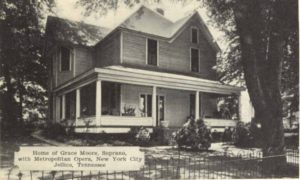
When Grace was around five years old, the family moved to Knoxville. Her father found a better business opportunity with Daniel Briscoe Company.3)Moore, Grace. You’re Only Human Once. Garden City: Doubleday, Doran & Co., 1944. p. 15 Three years later, the Moore family moved to Jellico in Campbell County, Tennessee because her father became “a partner in the Baird Dry Goods Company on the main Street.”4)Moore, Grace. You’re Only Human Once. Garden City: Doubleday, Doran & Co., 1944. p. 16Grace was a mischievous child in Jellico, often skipping school, and sometimes fighting. One day, when the circus came to town, she and her brothers skipped school and headed for the big top. The siblings were so enchanted they signed up, unbeknownst to their parents, to work there for ten dollars each. Her brothers were hired as clowns while Grace, her face thick with cosmetics and dressed head to toe in sparkles and rhinestones, was to ride the elephant ahead of the parade and beckon people to come. When the elephant passed by her father’s business, he was mortified. He yanked her off the creature and took her screaming into his store.5)Moore, Grace. You’re Only Human Once. Garden City: Doubleday, Doran & Co., 1944. p. 19-20As Grace puts it in her autobiography, You’re Only Human Once, she was “un-Jellicoish” and “failed to master the ABCs of proper Jellico behavior.” Yet, in this little town she found her love of music. She took piano lessons and sang in the church choir, which is where “her genius was discovered . . . by an international tenor on vacation.”6)Davis, Lee. “Grace is Still ‘Dick Moore’s Little Girl’ to Jellico Folk.” The Knoxville News-Sentinel, March 22, 1928: 13.Grace initially wanted to be a missionary, but something changed after an incident at her church when she was chastised for dancing. She still wanted to be a missionary but, as she says, “through my music.”7)Moore, Grace. You’re Only Human Once. Garden City: Doubleday, Doran & Co., 1944. p. 23
In 1915, when Grace was seventeen years old, she attended Nashville’s Ward-Belmont College, an all-female school created when Belmont College for Young Women merged with Ward Seminary for Young Ladies. The college is now the co-ed Belmont University. Once again, Grace had a difficult time fitting in. She broke the rules to attend a dance at Vanderbilt University and was subsequently sent back to Jellico. All was not a complete failure, though. She did settle on a career in singing, and she was more determined than ever to work for it. From here, there was some disagreement between Grace and her father as to which school, if any, Grace should attend.8)Moore, Grace. You’re Only Human Once. Garden City: Doubleday, Doran & Co., 1944.
In November 1918, after her father’s reluctance dissipated, she attended the Wilson-Greene School of Music in Washington, D. C.9)Press Dispatches. “Grace Moore’s Voice Carried Her From Jellico Choir to Metropolitan: Made Opera Stage Stepping Stone to Films, Radio.” Knoxville News-Sentinel, Jan 27, 1947: Front.Grace flourished at this school. Students attended various concert performances, where Grace met stars like Alma Gluck and Mary Garden. With the school’s connections, she made her first debut at the National Theatre in 1918 as the second singer in Giovanni Martinelli’s concert. After this success, Wilson-Greene School sent for Grace’s father to discuss a possible future stage career. Her father arrived but was fervently opposed and argued that “a southern girl of any ‘standing’” shouldn’t “even dream of going on STAGE!”10)Moore, Grace. You’re Only Human Once. Garden City: Doubleday, Doran & Co., 1944. p. 30 Once Grace realized her family would never support her career, “. . . she borrowed $300 from a friend, stole away from the school and waited a week in a Washington hotel for the search for her to cease.”11)Press Dispatches. “Grace Moore’s Voice Carried Her From Jellico Choir to Metropolitan: Made Opera Stage Stepping Stone to Films, Radio.” Knoxville News-Sentinel, Jan 27, 1947: Front.
She still needed a source of income, so she worked as a singer for the Black Cat Club.12)Moore, Grace. You’re Only Human Once. Garden City: Doubleday, Doran & Co., 1944. p. 35 She strained her voice and was diagnosed by Dr. Marafioti, physician to most Metropolitan Opera singers, with acute laryngitis. She was subsequently forced to seclude herself in silence for three months.13)Moore, Grace. You’re Only Human Once. Garden City: Doubleday, Doran & Co., 1944. p. 39-40Dr. Marafioti played an important role in Moore’s life. He became her teacher and voice coach, as well as the voice coach for several opera singers and Hollywood actors. Once her health and voice returned, she signed her first Broadway contract for seventy-five dollars a week with Mr. F. C. Whitney as the dramatic lead in his play, Suite Sixteen.14)Moore, Grace. You’re Only Human Once. Garden City: Doubleday, Doran & Co., 1944. p. 42 The Washington Post states Moore debuted in New York in 1921 as singer and understudy to Julia Sanderson in Raymond Hitchcock’s musical revue, Hitchy-Koo.15)The Washington Post. “Grace Moore to Sing with Metropolitan.” The Washington Post, Oct 2, 1927: M-3.Opportunities opened for Grace when she replaced Sanderson one night, after the latter contracted a stomach illness.16)Press Dispatches. “Grace Moore’s Voice Carried Her From Jellico Choir to Metropolitan: Made Opera Stage Stepping Stone to Films, Radio.” Knoxville News-Sentinel, Jan 27, 1947: Front.17)Moore, Grace. You’re Only Human Once. Garden City: Doubleday, Doran & Co., 1944. p. 49-51 In the ensuing years of the 1920s, Grace met and befriended so many people in the Bohemian culture. She spent a good portion of time with artistically talented people – George Gershwin, Mischa Levitski, Dorothy Parker, George S. Kaufman, Franklin Pierce Adams (F.P.A.) – and, though Grace wasn’t a member of the Algonquin Round Table, she certainly was close to the periphery.18)Moore, Grace. You’re Only Human Once. Garden City: Doubleday, Doran & Co., 1944. p. 52-55
In May, 1921, Grace made her first of many trips to Europe on a cruise ship.19)Moore, Grace. You’re Only Human Once. Garden City: Doubleday, Doran & Co., 1944. p. 58While she was in France, she was tapped to play the “prima-donna” lead in the U.S. Music Box Revue. Irving Berlin, who had traveled to Paris as a tourist, personally offered her the role, and the contract was signed on a tablecloth at a Paris café.20)Moore, Grace. You’re Only Human Once. Garden City: Doubleday, Doran & Co., 1944. p. 80She was back in the states for a time. As it turned out, the Revue sparked her career into high gear. All throughout her beginning successes, she continued her music studies with Marafioti. Moore made her first public appearance at the Metropolitan Opera Company in April 1924, singing “What’ll I do” at a benefit concert.21)Moore, Grace. You’re Only Human Once. Garden City: Doubleday, Doran & Co., 1944. p. 91She performed at several other venues, like the Roxy Theater where she sang ‘Minnie the Moocher’ and ‘Vissi d’Arti’.22)Press Dispatches. “Grace Moore’s Voice Carried Her From Jellico Choir to Metropolitan: Made Opera Stage Stepping Stone to Films, Radio.” Knoxville News-Sentinel, Jan 27, 1947: Front.Further, on another trip to Europe, she sang with the All-American Grand Opera Company. And, after a nerve-racking third audition in Milan, Grace Moore signed a contract with the Metropolitan Opera on June 13th, 1927.23)Moore, Grace. You’re Only Human Once. Garden City: Doubleday, Doran & Co., 1944. p. 124Moore would play the role of ‘Mimi’ in La Boheme for her debut.24)Press Dispatches. “Grace Moore’s Voice Carried Her From Jellico Choir to Metropolitan: Made Opera Stage Stepping Stone to Films, Radio.” Knoxville News-Sentinel, Jan 27, 1947: Front.Before the performance, she was invited to a celebratory luncheon given by Southerners (especially Tennesseans), including her father and mother.25)Moore, Grace. You’re Only Human Once. Garden City: Doubleday, Doran & Co., 1944. p. 132She never forgot the Tennesseans who encouraged or befriended her along the way. She organized “a special train” to bring “her friends from Tennessee” to New York for the performance.26)Press Dispatches. “Grace Moore’s Voice Carried Her From Jellico Choir to Metropolitan: Made Opera Stage Stepping Stone to Films, Radio.” Knoxville News-Sentinel, Jan 27, 1947 p. 8.After a year at the Met, Moore decided to return to Europe and perform in various opera houses. She was very popular and successful throughout the continent.27)Moore, Grace. You’re Only Human Once. Garden City: Doubleday, Doran & Co., 1944. p. 142-159
Her career in Hollywood happened when Louis B. Mayer attended the Metropolitan performance of Lawrence Tibbet singing Pagliacci. Mayer sat by Grace and asked her to come to Metro Studios in New York and she agreed. After singing aria from La Boheme in a screen test, she signed a contract with M.G.M.28)Moore, Grace. You’re Only Human Once. Garden City: Doubleday, Doran & Co., 1944. p. 163-164She still fulfilled singing engagements and performances the entire time she was under contract. She played the character Jenny Lind in her first movie, A Lady’s Morals. The film “broke no box-office records, either high or low” but found a fairly good reaction in Europe which was “good enough for M.G.M. to feel that a French version might be profitable.”29)Moore, Grace. You’re Only Human Once. Garden City: Doubleday, Doran & Co., 1944. p. 170She went on to star in New Moon (1930), Jenny Lind (1931), One Night of Love (1934) (where she was nominated for an Oscar for Best Actress in a Leading Role), Love Me Forever (1935), The King Steps Out (1936), When You’re in Love (1937) (Incidentally, the second billing in this movie was Cary Grant.), I’ll Take Romance (1937), and Louise (1939). She was the first opera singer who offered “the first successful presentation of opera on the screen.”30)Press Dispatches. “Grace Moore’s Voice Carried Her From Jellico Choir to Metropolitan: Made Opera Stage Stepping Stone to Films, Radio.” Knoxville News-Sentinel, Jan 27, 1947 p. 8.In addition to motion pictures, Moore had her own radio program31)Press Dispatches. “Grace Moore’s Voice Carried Her From Jellico Choir to Metropolitan: Made Opera Stage Stepping Stone to Films, Radio.” Knoxville News-Sentinel, Jan 27, 1947 p. 8.and made appearances in other radio shows. Her motion picture career was immensely successful, though her entrance was less than satisfactory to executives. Nevertheless, the opera community wasn’t having it. As Grace puts it, “My picture failure . . . removed the golden sheen from my Metropolitan debut, and . . . it took me out of an established category.”32)Moore, Grace. You’re Only Human Once. Garden City: Doubleday, Doran & Co., 1944. p. 177
After New Moon, she packed her bags and took a long-overdue hiatus. She sailed to France on the Ile de France in May 1931 – and met her future husband, Spanish actor and singer Valentin Parera on that ship. They were married July 15, 1931 by the deputy mayor of Cannes,33)Associated Press. “Grace Moore Weds Spanish Actor At Civil Ceremony in Cannes.” The Atlanta Constitution , Jul 16, 1931: 4. in a quiet courthouse wedding, though several famous people – Charlie Chaplin, Gloria Swanson, Mrs. Gloria Vanderbilt, to name a very few – attended.34)“Grace Moore, Singer, Wed To Spanish Movie Actor.” The Washington Post, Jul 16, 1931: 7.They were happily married for over fifteen years, until her death in 1947.
During World War II, Grace Moore made several tours “under the patronage of Nelson A. Rockefeller, Coordinator of Inter-American Affairs.”35)Moore, Grace. You’re Only Human Once. Garden City: Doubleday, Doran & Co., 1944. p. 262In the United States, she held a concert for Fort Benning soldiers. She was initially “told that no soldiers could be invited because all regular seats had been sold.” Grace had none of that disregard. She found “extra room on the stage” and, during the concert, “turned and sang directly to her soldier guests on the stage.”36)“Soldiers Guests of Grace Moore.” The Atlanta Constitution, Feb 26, 1942: 20.She also visited and entertained wounded soldiers at Walter Reed Hospital.37)“Grace Moore To Aid Children, Sing for Wounded.” The Washington Post, May 21, 1944: M4.Her support for those fighting the Nazis wasn’t limited to the United States, either. Her Riviera villa (Casa Lauretta near Cannes) fed and sheltered “French patriots sought by the Nazis during the four years of German Occupation.” Her former chauffeur and gardener, Julien, converted the place “into a relay station for patriots fleeing the Gestapo.” Due to her support, she had “hidden, clothed and fed more than fifty patriots.”38)New York Times. “French Patriots Hidden In Grace Moore’s Villa.” The New York Times, Aug 31, 1944: 6.
She was a truly benevolent person and received various honors throughout her life. She was a member of the National Committee to Save the Children Federation, Inc. The organization provided necessary items and educational resources for children in Appalachia (specifically, Southern Appalachia).39)“Grace Moore To Aid Children, Sing for Wounded.” The Washington Post, May 21, 1944: M4.Grace founded and funded a music school in Newtown, Connecticut, near her farm, for young singers whose families couldn’t afford music school. The school was scheduled to open in 1940.40)Siler, Tom. “Grace Moore Founds Singing School To Give Talented Youngsters Help She Didn’t Have.” The Knoxville News-Sentinel, Nov 10, 1939: 12.A few of her honors are mentioned here. She was “made a chevalier of the French Legion of Honor for services to French music and culture generally.”41)The New York Times. “Grace Moore Becomes French Legionnaire.” The New York Times, Jan 29, 1939: Four A.She “received the Ingenio del Arti medal, Denmark’s highest artistic decoration, from King Christian.”42)Press Dispatches. “Grace Moore’s Voice Carried Her From Jellico Choir to Metropolitan: Made Opera Stage Stepping Stone to Films, Radio.” Knoxville News-Sentinel, Jan 27, 1947: Front.43)“Grace’s Childhood Prank Recalled.” The Knoxville News-Sentinel, Jan 27, 1947: 8.She received a gold medal from King Gustav of Sweden. She performed at the most prestigious places in the world, one of which was the British royal house in Covent Garden,44)Press Dispatches. “Grace Moore’s Voice Carried Her From Jellico Choir to Metropolitan: Made Opera Stage Stepping Stone to Films, Radio.” Knoxville News-Sentinel, Jan 27, 1947: Front.45)“Grace’s Childhood Prank Recalled.” The Knoxville News-Sentinel, Jan 27, 1947: 8. and another was at the United Nations.46)The New York Times. “Grace Moore Back; Tells of Conversion.” The New York Times, June 7, 1946: 18.
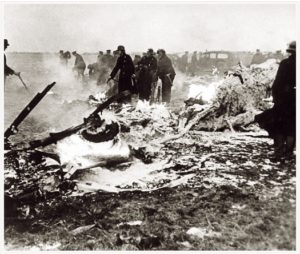
All her goodness, her life, her plans, her dreams were forever broken on January 27, 1947, when a Dutch Airline Dakota DC-3 airplane, en route to Stockholm from Copenhagen, “nosedived . . . two minutes after take-off.” All sixteen passengers and six crew members perished. People on the ground said the plane “made a remarkably steep ascent, at an angle of almost 60 degrees . . . tried to flatten out, but the plane stalled, rolled twice while falling and crashed, hitting the airfield with its left wingtip.” It burst into flames and exploded. Rescuers couldn’t reach the plane for over an hour. Bodies, or parts of bodies, were recovered, still in their seatbelts, which indicated an instant death.47)Carstensen, Svend. “Grace Moore Dies In Burning Plane; Prince Also Killed.” New York Times, Jan 27, 1947: Front.
According to the Svend Carstensen’s January 27, 1947 New York Times article entitled “Grace Moore Dies In Burning Plane; Prince Also Killed,” other victims included:
• Prince Gustav Adolf of Sweden – heir to the Swedish throne. He and Stenbock “had been hunting near Amsterdam with Prince Bernhard of the Netherlands.” He was survived by his wife, “former German Princess Sibulla of Saxe-Coburg-Gotha,” four daughters and a son, “Carl Gustaf, who became, on his father’s death, second in line of the succession to the Swedish throne.”48)Carstensen, Svend. “Grace Moore Dies In Burning Plane; Prince Also Killed.” New York Times, Jan 27, 1947: Front.
• Count Stenbock – the prince’s assistant
Members of Miss Moore’s staff:
• Jean Loup Peltier from France – accompanist
• Roland Fernand Malbec – impresario
• Gerda Newmann – Danish actress and singer, her husband, impresario Jens Dennow, and her three-year-old nephew
• Hans Denning Thomsen – Danish citizen who helped Dennow arrange Moore’s Scandinavian trip
• Ellen Fehrmann – from Copenhagen
• Ellis Grandt – Danish civil engineer
• Turvhagen – Swedish citizen
• Borg Brix – Danish civil engineer
• Engell – Dutch citizen
• Izquierdo – Spanish man
• G.J. Geysendorffer – Senior pilot
• H.G. Macksprang (or Mackeprang) – Airline official
Moore’s body was “identified . . . by a gold bracelet which her husband had given her inscribed, ‘Grace from Val.’,”49)United Press. “Pay Loads Lightened by Denmark, Sweden.” The Knoxville News-Sentinel, Jan 28, 1947: 8.which “still smelled of French perfume.” Prince Adolf’s medals were found in the wreckage.50)Press Dispatches. “Grace Moore’s Voice Carried Her From Jellico Choir to Metropolitan: Made Opera Stage Stepping Stone to Films, Radio.” Knoxville News-Sentinel, Jan 27, 1947: Front.Personal belongings were found months after the crash. A trinket that belonged to Grace Moore, “presented . . . by King Haaken VII of Norway was found” almost six months later.51)The Atlanta Constitution. “Grace Moore Trinket Found in Crash Area.” The Atlanta Constitution, June 6, 1947: 21.

A few theories were discussed as to the initial cause of the crash. It should be noted that the airplane was inspected before the flight and passed. 52)Carstensen, Svend. “Grace Moore Dies In Burning Plane; Prince Also Killed.” New York Times, Jan 27, 1947: Front.One belief was that the plane climbed too fast which affected the aircraft’s control. The prevalent theory at the time was that the plane was simply bogged down with too much weight. Prior to this crash, complaints had been levied by Scandinavian countries against British air regulations which okayed a “14-ton load allowance.”53)Press Dispatches. “Grace Moore’s Voice Carried Her From Jellico Choir to Metropolitan: Made Opera Stage Stepping Stone to Films, Radio.” Knoxville News-Sentinel, Jan 27, 1947: Front.Denmark and Sweden called for lighter payloads in wake of the crash. The cause became clear upon further investigation. An inexperienced and improperly trained employee, who started his job just twenty days prior, “failed to remove the elevator locking pins.” This terrible mistake caused the pilot to have no control over the plane.
Moore’s husband accompanied the body to Chattanooga, Tennessee where she was “buried in the Moore family plot in Forest Hills Cemetery.”54)United Press. “Pay Loads Lightened by Denmark, Sweden.” The Knoxville News-Sentinel, Jan 28, 1947: 8.Her family had moved to Chattanooga in 1932 “after purchasing” Lovemans Department store. They lived on Riverview’s Hillcrest Road.55)United Press. “Pay Loads Lightened by Denmark, Sweden.” The Knoxville News-Sentinel, Jan 28, 1947: 8.Valentin was devastated upon his wife’s death – as was the whole world – and it appears he went in seclusion, as his biography on Internet Movie Data Base (IMDB) quotes, he “lets [sic] himself fall in a long period of inactivity.” Moore left the “bulk of the estate, valued at $500,000” to him.56) The Washington Post. “Grace Moore’s Estate Probated at $500,000 .” The Washington Post, Mar 27, 1947: 9.Memorial services were held throughout Europe, and, in the United States, from Newtown, Connecticut to New York City’s Riverside church.57)United Press. “Pay Loads Lightened by Denmark, Sweden.” The Knoxville News-Sentinel, Jan 28, 1947: 8.
Grace Moore was a beloved opera singer, radio personality, and film star. She loved her fans and found every one of life’s adventures thrilling. She knew and respected people from all walks of life and never forgot her roots. She was proud to call herself a Tennessee Hillbilly and a country girl from Slabtown, Tennessee. Appalachia lost a bright light when she died so suddenly. Indeed, so did the world. It is my sincere hope that, with a little bit of information here from newspaper sources, a few online sites, and her autobiography, her spark will produce a steady, incandescent glow in our hearts and minds.
*Title is Grace’s own words from a Copenhagen interview, January 21, 1947
A Grace Moore Gallery
References
| ↑1 | Cocke County. The History of Cocke County. 2020. http://www.cockecountytn.gov/history/ (accessed Feb 2020). |
|---|---|
| ↑2 | Ogden, Warner. “‘Nough,’ Grace Moore Would Say, If She Told Birthplace – ‘Between Nough and Del Rio, Tenn.’.” The Knoxville News-Sentinel, Sept 13, 1936: A-6. |
| ↑3 | Moore, Grace. You’re Only Human Once. Garden City: Doubleday, Doran & Co., 1944. p. 15 |
| ↑4 | Moore, Grace. You’re Only Human Once. Garden City: Doubleday, Doran & Co., 1944. p. 16 |
| ↑5 | Moore, Grace. You’re Only Human Once. Garden City: Doubleday, Doran & Co., 1944. p. 19-20 |
| ↑6 | Davis, Lee. “Grace is Still ‘Dick Moore’s Little Girl’ to Jellico Folk.” The Knoxville News-Sentinel, March 22, 1928: 13. |
| ↑7 | Moore, Grace. You’re Only Human Once. Garden City: Doubleday, Doran & Co., 1944. p. 23 |
| ↑8 | Moore, Grace. You’re Only Human Once. Garden City: Doubleday, Doran & Co., 1944. |
| ↑9, ↑11, ↑16, ↑22, ↑24, ↑42, ↑44, ↑50, ↑53 | Press Dispatches. “Grace Moore’s Voice Carried Her From Jellico Choir to Metropolitan: Made Opera Stage Stepping Stone to Films, Radio.” Knoxville News-Sentinel, Jan 27, 1947: Front. |
| ↑10 | Moore, Grace. You’re Only Human Once. Garden City: Doubleday, Doran & Co., 1944. p. 30 |
| ↑12 | Moore, Grace. You’re Only Human Once. Garden City: Doubleday, Doran & Co., 1944. p. 35 |
| ↑13 | Moore, Grace. You’re Only Human Once. Garden City: Doubleday, Doran & Co., 1944. p. 39-40 |
| ↑14 | Moore, Grace. You’re Only Human Once. Garden City: Doubleday, Doran & Co., 1944. p. 42 |
| ↑15 | The Washington Post. “Grace Moore to Sing with Metropolitan.” The Washington Post, Oct 2, 1927: M-3. |
| ↑17 | Moore, Grace. You’re Only Human Once. Garden City: Doubleday, Doran & Co., 1944. p. 49-51 |
| ↑18 | Moore, Grace. You’re Only Human Once. Garden City: Doubleday, Doran & Co., 1944. p. 52-55 |
| ↑19 | Moore, Grace. You’re Only Human Once. Garden City: Doubleday, Doran & Co., 1944. p. 58 |
| ↑20 | Moore, Grace. You’re Only Human Once. Garden City: Doubleday, Doran & Co., 1944. p. 80 |
| ↑21 | Moore, Grace. You’re Only Human Once. Garden City: Doubleday, Doran & Co., 1944. p. 91 |
| ↑23 | Moore, Grace. You’re Only Human Once. Garden City: Doubleday, Doran & Co., 1944. p. 124 |
| ↑25 | Moore, Grace. You’re Only Human Once. Garden City: Doubleday, Doran & Co., 1944. p. 132 |
| ↑26, ↑30, ↑31 | Press Dispatches. “Grace Moore’s Voice Carried Her From Jellico Choir to Metropolitan: Made Opera Stage Stepping Stone to Films, Radio.” Knoxville News-Sentinel, Jan 27, 1947 p. 8. |
| ↑27 | Moore, Grace. You’re Only Human Once. Garden City: Doubleday, Doran & Co., 1944. p. 142-159 |
| ↑28 | Moore, Grace. You’re Only Human Once. Garden City: Doubleday, Doran & Co., 1944. p. 163-164 |
| ↑29 | Moore, Grace. You’re Only Human Once. Garden City: Doubleday, Doran & Co., 1944. p. 170 |
| ↑32 | Moore, Grace. You’re Only Human Once. Garden City: Doubleday, Doran & Co., 1944. p. 177 |
| ↑33 | Associated Press. “Grace Moore Weds Spanish Actor At Civil Ceremony in Cannes.” The Atlanta Constitution , Jul 16, 1931: 4. |
| ↑34 | “Grace Moore, Singer, Wed To Spanish Movie Actor.” The Washington Post, Jul 16, 1931: 7. |
| ↑35 | Moore, Grace. You’re Only Human Once. Garden City: Doubleday, Doran & Co., 1944. p. 262 |
| ↑36 | “Soldiers Guests of Grace Moore.” The Atlanta Constitution, Feb 26, 1942: 20. |
| ↑37, ↑39 | “Grace Moore To Aid Children, Sing for Wounded.” The Washington Post, May 21, 1944: M4. |
| ↑38 | New York Times. “French Patriots Hidden In Grace Moore’s Villa.” The New York Times, Aug 31, 1944: 6. |
| ↑40 | Siler, Tom. “Grace Moore Founds Singing School To Give Talented Youngsters Help She Didn’t Have.” The Knoxville News-Sentinel, Nov 10, 1939: 12. |
| ↑41 | The New York Times. “Grace Moore Becomes French Legionnaire.” The New York Times, Jan 29, 1939: Four A. |
| ↑43, ↑45 | “Grace’s Childhood Prank Recalled.” The Knoxville News-Sentinel, Jan 27, 1947: 8. |
| ↑46 | The New York Times. “Grace Moore Back; Tells of Conversion.” The New York Times, June 7, 1946: 18. |
| ↑47, ↑48, ↑52 | Carstensen, Svend. “Grace Moore Dies In Burning Plane; Prince Also Killed.” New York Times, Jan 27, 1947: Front. |
| ↑49, ↑54, ↑55, ↑57 | United Press. “Pay Loads Lightened by Denmark, Sweden.” The Knoxville News-Sentinel, Jan 28, 1947: 8. |
| ↑51 | The Atlanta Constitution. “Grace Moore Trinket Found in Crash Area.” The Atlanta Constitution, June 6, 1947: 21. |
| ↑56 | The Washington Post. “Grace Moore’s Estate Probated at $500,000 .” The Washington Post, Mar 27, 1947: 9. |

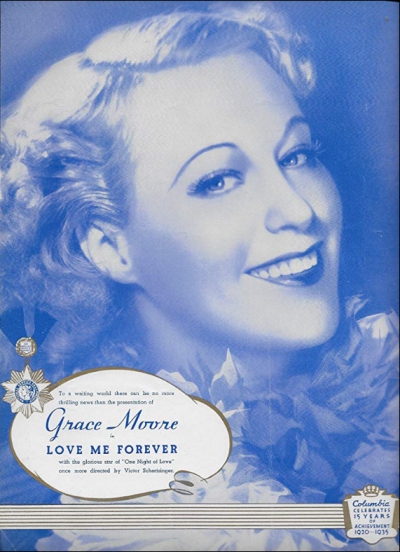

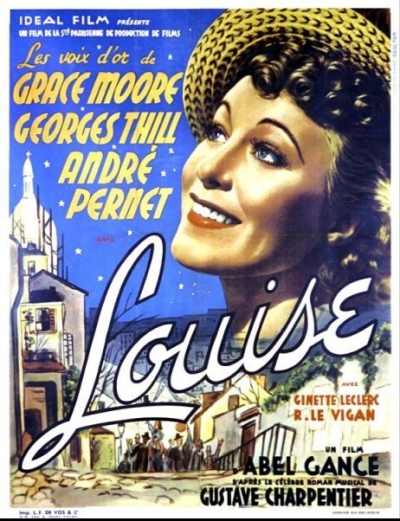
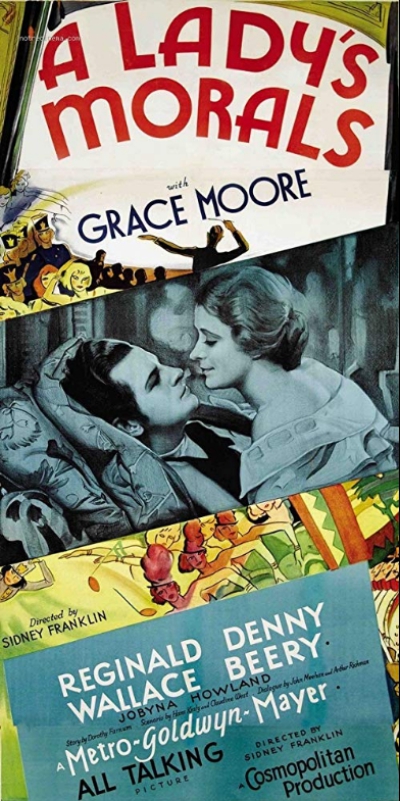

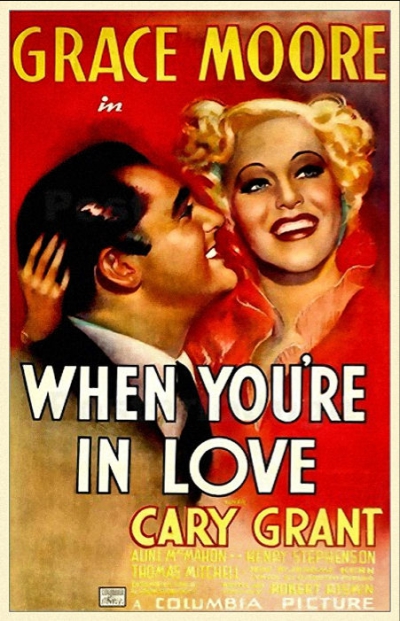


















Thanks for this fascinating story–I’m one of those who needed an introduction. I was intrigued by Grace’s Chattanooga connection. I remember the downtown Lovemans department store and the fancy mansions in Riverview. Next time I’m down that way, I’ll have to visit her gravesite.
I’m glad you liked it, Jim. I was told about Grace Moore when I was a little girl, and I was delighted to write a piece on her very extraordinary life. She did visit Chattanooga quite a bit. If you do journey to Forest Hills, let me know your impression. I found it interesting, too, that her immediate family (save one brother who moved to Illinois and was a successful merchant as well) chose to live somewhere in Tennessee whenever they moved.
Thank you for this interesting article on such a remarkable woman. My father told me his maternal grandmother, Lucretia Crockett, who was born in Surgoinsville in 1888 and lived most of her life in Morristown, used to say that she and Grace Moore were cousins. He didn’t know any more than that, but our family would sure love to know more about this possible connection.
Hello LaDonna. I’m glad you liked the article. I’ve been wanting to reintroduce her for a long time. Is Crockett your great-great grandmother’s maiden name? I did a smidgen of research about her relation to Grace Moore, but it’s difficult to find. I have a list of genealogical websites for you to peruse: Family Search, USGenWeb and TNGenWeb, Linkpendium, Wikitree, and Geni. These sites were helpful for my own genealogical research and they might be for you as well. I did find some interesting information on the Crocketts in general, and their relation to East Tennessee and Davy Crockett.